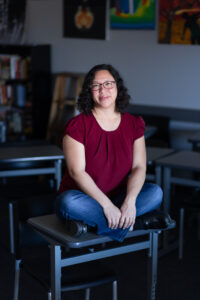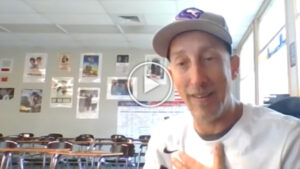Video transcript:
One of the differences between learning from an AI program and learning with a teacher in a dialectical manner is that you don’t have that empathy, connection, dialogue.
All of our kids have so much potential and deserve for someone to have high expectations of them and to help them improve and grow, whatever that means for them.
There’s a metaphor that I sometimes use that I told this student one time when they were a freshman. And I didn’t think they remembered it, and then they brought it up to me years later when they were out of high school: that sometimes you are struggling in the quicksand, and if you feel like you’re sinking, you can’t always reach out your hand to somebody else who’s struggling because you might drag yourself down even further.
And so it’s okay to say, “Hey, friend who’s having a hard time. I can’t help you right now. I’m gonna help you find some other help.” And then when you’re on stronger ground, you can reach out and help more people, when your well is more full. Right? You can give water to somebody else.
And years later, the student brought that back up to me: “Hey, remember the quicksand thing that we talked about?”
That was really meaningful to me that he remembered and that he uses that now. And I feel like this is someone now who’s on super strong ground, helping so many other people.
It just made me feel that teaching is one of those jobs where you gotta interact with other people as humans. It’s not just about what we teach them intellectually. It’s about two people making a human connection. And that’s important too.
The student Allyson mentions worked with her on a high school project about how service dogs can help people living with PTSD. This student eventually became a medical professional and travels all over the country to share what they’ve learned and help save people’s lives.
Share a link to this story
…or engage with Allyson’s video on:
A message from Allyson: I am a K-12 Teacher Librarian in a time of unprecedented challenges, book bans, and curriculum censorship. Here are a few ways to support the freedom to read and learn.
Visit the American Library Association’s Fight Censorship page to donate or take direct action
Join the ALA’s “Unite Against Book Bans” campaign
Check out the ACLU’s Right to Learn Toolkit
Support PEN America, which advocates for authors’ freedom to write
This video is one of 20 teacher interviews created to encourage the general public to #passthe🎤 to a teacher. You can view all video interviews here, on YouTube, on Facebook, or on Instagram Reels.


